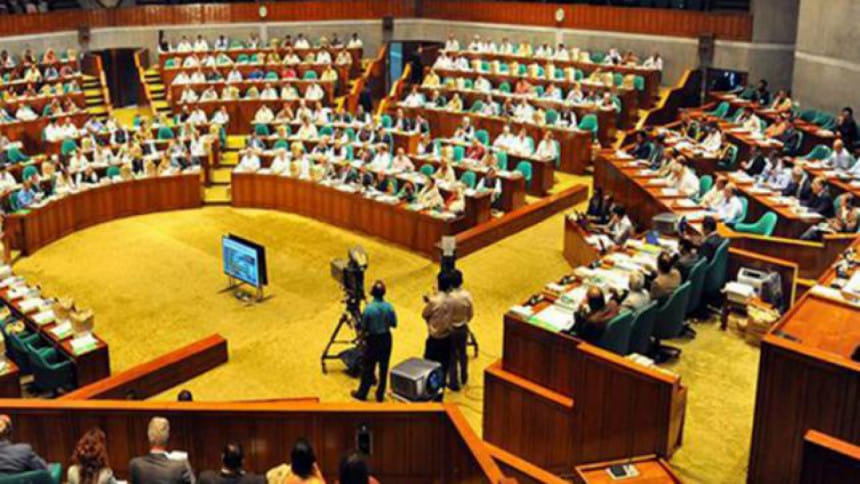Family grip on private banks to tighten

Parliament yesterday passed the Banking Companies (Amendment) Act 2017 amid criticism from various quarters that the revised law will help a single family tighten its hold on a private bank.
The tenure of a private bank's board of directors has been increased to nine years from six years, and four members of a family -- in place of two -- can now be included in the board, according to the new law.
Experts and economists warn that the amended act would further deepen the ongoing troubles in the banking sector.
It is evident from past experiences that a single family's control over a private bank is harmful to corporate governance, they say.
The act was passed at a time when the country's banking sector suffers from scams, money laundering and a lack of corporate governance.
Placing the bill in parliament, Finance Minister AMA Muhith said it would fulfil a long-standing demand from the owners of private banks.
Opposing the bill, lawmakers from the Jatiya Party, the main opposition in the House, as well as independent MPs said the placing of the bill shows the government bowed down to undue pressure from the owners of private bank.
They demanded that Muhith withdraw the bill, and take public opinion on it.
Muhith, however, rejected their demand, saying the draft law was approved by the cabinet following detailed discussions.
He also mentioned that the parliamentary standing committee on finance had scrutinised the bill and unanimously recommended its passage.
Protesting the bill, Opposition Chief Whip Tajul Islam Chowdhury and senior JP lawmaker Kazi Feroz Rashid sought to take floor, but Deputy Speaker Fazle Rabbi Mia, who was presiding over the sitting, rejected their pleas.
Earlier, JP lawmakers Fakhrul Imam, Nurul Islam Omar, Nur Hasna Lily Chowdhury, Nurul Islam Milon and Raushan Ara Mannan, and independent MPs Rustom Ali Farazi and Tahjib Alam Siddiqui took part in the discussions on the bill.
They said the bill will destroy the banking sector as private banks will eventually turn into family-controlled organisations.
“The law will serve the interest of the bank owners, not that of the depositors,” said JP lawmaker Fakhrul Imam.
Raushan Ara said, “Scams in the banking sector like the one in the Farmers Bank will increase further if the bill gets through.”
The bill was then passed by a voice vote despite objections from the JP and independent lawmakers.
Earlier, talking to reporters at the Secretariat in the afternoon, Muhith said some people raise objections whenever a law is passed in parliament.
WHAT EXPERTS SAY
Khondkar Ibrahim Khaled, former deputy governor of Bangladesh Bank, said the amended act would put the banking sector in a vulnerable situation as a single family's control over a bank will widen scope for corruption.
“Financial health of the National Bank Ltd, which had earlier performed as one of the four best banks, deteriorated significantly after the number of directors from a single family increased in the bank's board,” he said.
The bank has been hit by corruption for long with its default loans soaring. It would have been run smoothly if the family did not have control it bank, he said.
“Private banks are still operating better than the state-run ones. But, the private banks' financial indicators will deteriorate in the coming days due to the new law,” noted the ex-BB deputy governor.
AB Mirza Azizul Islam, a former finance adviser to a caretaker government, told The Daily Star that the amendment was not desirable from the perspective of good governance in the banking sector.
The existing problems of private banks, especially the fourth generation ones, will deepen as such a move will allow fewer people to make major decisions, he said.
Salehuddin Ahmed, a former governor of the central bank, said the bulk of the funds of private banks come from general people. It is not logical to allow four directors from a single family to decide on how the banks will be run.
“The interest of the depositors will be harmed because of the amended act,” he said.
The new law is contrary to the previous one enacted during the tenure of the Awami League-led government in 2013.
The Banking Companies Act 1991, amended in 2013, allowed two members of a family to be included in a bank's board. The tenure of a director was set at three years and a director was allowed to hold the post for a maximum of two terms -- three years each.

 For all latest news, follow The Daily Star's Google News channel.
For all latest news, follow The Daily Star's Google News channel. 








Comments